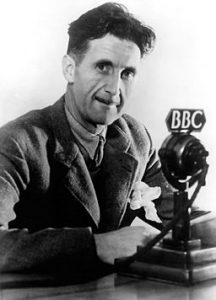This article was written by Dr Ben Worthy from Birkbeck’s Department of Politics

George Orwell
Nineteen Eighty Four tells the story of Winston Smith, a lowly member of the ruling party, rebelling against the totalitarian rule of Big Brother and The Party in Airstrip One (formerly England), part of the vast empire of Oceania. George Orwell’s novel shows with a terrifying clarity what a totalitarian regime looks like from the inside, with its propaganda, controlled hatred and perpetual war. The book was considered so realistic that when copies were sneaked illegally into the USSR, illicit readers presumed it was written by someone close to Stalin.
As others have pointed out, what makes it so powerful are the details that we all recognise. The dictatorship is all powerful yet the in the England of ‘Airstrip One’ sinks are still blocked, greasy canteens serve sloppy food and tower blocks smell of cabbage. When Winston Smith sleeps and dreams of freedom he wakes up with the name ‘Shakespeare’ on his lips. Unlike the brilliant abstract novel We that inspired Orwell, this dystopia, like Margaret Atwood’s The Handmaid’s Tale, feels very close by (see Orwell’s review of We here).
The world in which Smith moves also feels scarily relevant. The leaders in Oceania control their people through targeted hatred and predict what they do before they do it. There are uncomfortable echoes of the dark side of a surveillance society and big data: they can even monitor you through your television. The book is also full of ‘political language’ that ‘is designed to make lies sound truthful and murder respectable, and to give an appearance of solidity to pure wind’. Double-think dominates a world where those in power can believe contradictory things simultaneously and bend reality at will. Opening up Orwell’s book today, Oceania’s propaganda slogan ‘ignorance is strength’ rings far too familiar for comfort.
Alongside the torture in Room 101 and the mind reading Thought Police, the truly terrifying feature of Winston’s world is the lack of objective truth. In Oceania it is impossible to establish something as a fact: what the Party says is true is the only truth. Winston Smith works in a Ministry constantly amending previous editions of newspapers, altering the past to control the future. Orwell’s fictional Oceania does what the truly horrific regimes of the Twentieth century tried to do: create their own ‘moral universe’ insulated from reality. Primo Levi wrote of how those in the camps in Nazi Germany were taunted by the guards with the constant gloating that ‘no one will ever believe this happened’.
Orwell’s original title for the book was ‘The Last Man in Europe’. Smith’s struggle to love and live in Oceania is a struggle to preserve his humanity. Despite its reputation as a vision of an alternative future, the dystopia of Oceania is as much a warning as a prophesy. Orwell’s book, written in beautiful clear prose, offers us a frightening glimpse of what life was like for many people (and still is like in many places). Is it completely bleak? Read the mysterious appendix on Newspeak that Orwell eccentrically insisted on keeping in, even for Reader’s Digest. It’s written in the past tense.
Listen to Jean Seaton, Ben Worthy and Caroline Edwards discuss 1984 at Birkbeck Arts Week event ‘Will 2017 be 1984? Rethinking Orwell’s dystopia’ on 17/5/2017 at 6pm. For tickets click here.
